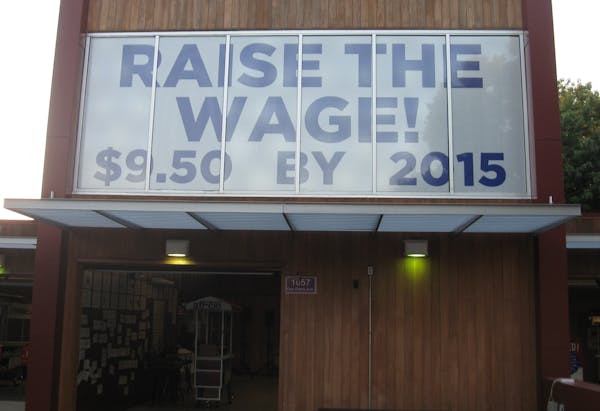Unsurprisingly, the editorial board of the Star Tribune is on board organized labor's "Raise the Wage!" bandwagon, asserting in the headline for its Sept. 1 editorial that a "higher wage floor would help families."
Who could be against "helping families" by increasing the minimum wage? Well, begin with practically every labor economist who would like one less piece of economic illiteracy to correct.
There is an "11th Commandment" of sorts in economics: "Thou shalt never do only one thing." This applies with a vengeance to public policy. All public policies present us with trade-offs, and all public policies create secondary effects.
The minimum wage is no exception. We can't simply impose higher wages and call it a day. To be responsible as well as compassionate, legislators must consider not only the seemingly obvious initial effects of public policy, but the less obvious secondary effects as well.
Wages are a price that firms pay to acquire the productivity of labor. The law of demand predicts that when the price of low-productivity labor is increased, employers will respond by purchasing less such labor. (This effect grows larger over time.)
Minimum-wage increases thus harm the most vulnerable and least competitive members of the labor force, typically the young and inexperienced. Forced to pay a higher minimum wage, many firms will find it sensible to replace those on the bottom rung of the employment ladder with higher-productivity workers.
Or, firms may respond by altering the terms of employment where they can, reducing non-money compensation like free meals, uniforms or hourly breaks that workers value.
Alternatively, rather than substituting higher-productivity workers for now-more-costly lower-productivity workers, firms might substitute capital instead. Just as consumers buy less of a good at higher prices, firms purchase less of an input at higher prices. (To repeat, this substitution process grows over time.) The unavoidable trade-off for raising the price of low-productivity, entry-level jobs is fewer of those jobs. Thou shalt never do only one thing.
Nor are low-income households likely to benefit from an increased minimum wage. The National Bureau of Economic Research recently published work in which the authors find "no compelling evidence" that minimum wages raise household incomes.
They found that the "disemployment effects" on some household incomes (the loss of a job or the inability to find a job at higher mandated wages) more than offset the income effects in other households of higher wages for those who manage to keep their jobs.
Since both these effects are concentrated in lower-income households, the authors conclude that minimum wages simply redistribute income among low-income families, that they "help to raise the level of income above the poverty line in some families, but push income below the poverty line in others."
Economists have long recognized that a minimum wage is a very bad antipoverty tool, poorly focused with some ugly side effects. To raise low household incomes, the Earned Income Tax Credit is a superior tool, having the virtue of not distorting relative labor prices, and thus not harming the most vulnerable and least competitive members of the labor force.
Poverty has many causes; a low wage is not one of them. Low wages are instead a result of low labor productivity. For many workers, minimum-wage jobs are the first rung on the productivity ladder, a means of getting work experience — of learning how to get and keep a job, then go on to the next.
As such, they are an invaluable source of productivity increasing "human capital," worth more to workers than the wage alone. Minimum-wage laws result in fewer of these jobs, and discriminate against the least employable workers, the very people labor policy should be trying to help.
The Bureau of Labor Statistics reports that for July, white teen (ages 16 to 19) unemployment for both sexes stood at a seasonally adjusted and dismal 20.3 percent, while their black or African-American counterparts were suffering a horrendous 41.6 percent rate of unemployment.
Now our political elites are gearing up to price these workers even further out of the market. It's a shame.
---------------
Michael J. McIlhon, of Eagan, is an economics professor.
The courage to follow the evidence on transgender care

Republicans wanted a crackdown on Israel's critics. Columbia obliged.


